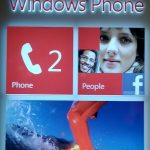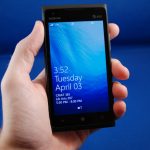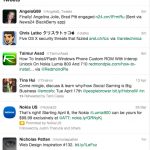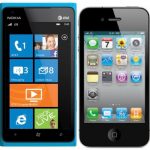The measure of Windows Phone's failure is...

There are many measures, but one piqued my attention last week. According to Nielsen, Windows Mobile US smartphone market share, based on install base not unit shipments, is considerably higher than its successor -- 4.1 percent versus 1.7 percent for newer Windows Phone. Interpret however you like: Windows Mobile is so good, many Americans stick with it; Windows Phone isn't doing well after two version releases and 18 months of sales.
Nielsen's numbers are for first quarter, when Android share reached 48.5 percent, effectively from zero three years ago (the OS debuted on one smartphone from one carrier in Q4 2008). The next two places go to iOS and BlacBerry, with 32 percent and 16 percent share, respectively. In second quarter 2011: Android, 39 percent; iOS, 28 percent; BlackBerry, 20 percent; Windows Mobile/Phone, 9 percent. So Microsoft's overall share measured by both operating systems is down by one-third in just three quarters.
Nokia fragments Windows Phone Marketplace with more exclusive apps

At a relatively quiet opening day of the CTIA Wireless International 2012 convention on Tuesday, mobile phone maker Nokia announced its Lumia Windows Phones will receive a handful of exclusive applications that other Windows Phones will not, including apps from ESPN, AOL, and Groupon.
When the Lumia line of Nokia Windows Phones launched, Nokia provided a few solid exclusives, including Maps, Drive, and Music to improve usability and desirability of the devices. These apps are still not available on other Windows Phones in the Marketplace.
Windows Live is dead, long live Windows Live

In a blog post on Wednesday, President of Microsoft's Windows division Steven Sinofsky announced the seven-year old Windows Live brand is being retired.
Do not be mistaken, there are more than 500 million users of the various Microsoft services that fall under the general classification of Windows Live. They are alive and well.
Is there hope for Windows Phone?

That's the question I'm asking after looking over comScore US mobile subscriber data for the three months ending in March. After years of steady, steep declines, Windows Phone subscriber share held steady from February to March, which perhaps not coincidentally is when Nokia Lumia 900 went on sale. Could it be...
comScore measures subscribers 13 years and older. Microsoft mobile share among smartphone subscribers held steady at 3.9 percent month-on-month, the first real stop in drop in years. How mighty is Microsoft's fall? Market share was 19 percent in September 2009, for example. So 3.9 percent is nothing to skinny, but staying there rather than going down is small, but notable improvement.
Windows Phone will gain serious market share this year

Let me repeat that a little more verbosely. Watch for Windows Phone to grab a serious hunk of market share at the end of 2012. No doubt about it. "Huh?" you ask. Believe it.
The Feibus-is-crazy club most assuredly is enjoying a surge in membership right about now. And why not? There is certainly plenty of evidence to suggest that Windows Phone thus far has underwhelmed.
Windows Phone holds back Nokia?

That's the sentiment expressed by a commenter to an exciting promotional video Nokia uploaded to YouTube today. The Finnish handset maker shot the promo using the new Nokia 808 PureView, which sports 41-megapixel camera. The comment: "This is true Nokia innovation. Windows Phone is just holding them back". My question: Do you agree with either or both sentiments?
I'm a big Nokia fan, who relished the benefits of great camera capabilities long before iPhone even had a crappy one. I've owned E71, N79, two different N95s, N96, N97 and N900. Nokia's N Series set the standard for mobile phone photography that most rivals have yet to catch up -- and that includes the N8 and N9, which capabilities should shame every iPhone 4/4S photographer. I clamor for Nokia 808 PureView but won't buy one. Symbian holds me back, or perhaps I should say Windows Phone. Compelling as the smartphone may be, Symbian is a dead end. Windows Phone is Nokia's primary mobile OS now.
Nokia's short-term pain is the result of long-term problems

Point. It's always fun to point the blame at someone, and everyone loves to blame CEO Stephen Elop for Nokia's woes. As the Finnish phone manufacturer began to burn, Elop came aboard and made a deal with his former employer, Microsoft, to adopt the Windows Phone platform. Pundits thought he was insane, and have criticized him repeatedly for the move.
These criticisms grow louder as Nokia reports a $1.3 billion euro ($1.76 billion) loss in the first quarter of 2012. According to the financial statements, the company burned through 700 million euros in cash during the same quarter, and has a little under five billion euros in cash left. The company may face bankruptcy in two years.
Nokia does the Windows Phone death dance

Few high-tech companies have imploded like Nokia and at the strangest time. Typically, dominant companies get killed during transitions from where they rule to where they don't. Nokia is oddest exception, imploding during a major computing era shift that favors its core competency. Transition from the PC to the mobile device eras is underway -- to a market where Nokia was, until recently, share leader by huge margins. How low the mighty has fallen, and former Microsoft division president turned Nokia CEO Stephen Elop wields the missile codes that launched self-inflicted nuclear strikes.
Today's Nokia earnings report is a disaster. It's radioactive fallout from Elop's decision to turn over the Finnish company's crown jewels to Microsoft. Elop sold Nokia's soul to his former masters, which I described at the time as a "silent takeover" of the company. Nokia needed new leadership, not new technology -- Elop's fundamental platform and cloud services switch -- to combat escalating Android and iOS competition. Before his tenure, Nokia did the right things, just in the wrong ways. Since taking the chief executive's seat in Autumn 2010, Elop has done the wrong things in all the right ways to destroy a once proud mobile device innovator.
Microsoft, Nokia, don't cheat Lumia owners of Windows Phone 8

Children often suffer when parents make bad decisions. For the marriage of Microsoft and Nokia, there is trouble looming for the kids -- that's you, buyers of Lumia smartphones. The next version of Windows Phone codename Apollo may not be supported. That's the rumor shooting across the web today. Here's one bit of gossip every current Windows Phone owner should hope is wrong.
I've got no inside intelligence here, hearing nothing either way about Lumia upgrades. But I can see scenarios where Apollo might be a problem, particularly for older CPUs or GPUs. For example, all current Windows Phones are single-core. Surely double-core handsets are coming, but will the software support single-core CPUs? It's the first question to ask, with rumors a flying and Microsoft not denying.
Don't cry for me, iPhone

Mark April 16th on your calendars as a day to remember -- and not because your taxes are due tomorrow, Americans. The weeks ahead promise cool ways to spend your refunds (assuming the tax man giveth back to you). Some of the best smartphones will arrive this week, with a blockbuster announcement coming in 17 days -- from Nokia and Samsung and another Samsung but with a big dash of Google sprinkled in. And Apple? Aaaaaahnt! Sound the game show buzzer. LTE iPhone is nowhere to be seen.
Coming April 22nd are not one, but two tasty 4G treats. As previously announced, Nokia Lumia 900 Windows Phone comes to AT&T all decked out in white -- yours for 100 bucks. Meanwhile, announced today, for an extra C Note, Sprint subscribers can get Galaxy Nexus along with fat $50 credit to put in their Google Wallet; the only real Google phone comes to the only national carrier with unlimited data. Looking ahead, Samsung today dispatched invites for a splashy May 3rd launch event -- it's the next Galaxy phone, baby. Don't cry for me, iPhone!
As if Nokia Lumia 900 Windows Phone didn't have enough problems...

Nokia has enough Lumia 900 marketing problems, without twitter making more. The photo with this post is pretty self-explanatory and shows how nasty promoted tweets can be.
The smartphone went on sale from AT&T April 8 for $99.99 -- that's quite a good price. Then almost immediately users started complaining about Internet connectivity problems, and Nokia quickly responded by making a magnanimous offer: $100 back to the people who already bought the phone and were willing to install a software update. Anyone else: Phone replacement. Meanwhile, Lumia 900 is free to new buyers until April 22. Okay, so why is there a promoted tweet in my feed on April 15: "That's right! Starting April 8, the Nokia #Lumia900 can be yours for $99.99 exclusively at @ATT"?
Nokia could teach Apple a thing or two about customer service

It’s the biggest product launch of the year so far for Windows Phone and Nokia. The Lumia 900 went on sale April 8th and early reports suggest that sales are better than expected. They're nothing stellar but nevertheless some good news for a platform struggling to gain market share.
Earlier this week, I convinced my mother to purchase her first Windows Phone, the Cyan Lumia 900. Later that afternoon, I learned of a serious software bug causing devices to literally lose their data connections --an essential feature for any smartphone. So admittedly, I was pretty concerned. It turns out, I didn’t need to be.
As Nokia transforms into a smartphone company, performance disappoints

Finnish mobile phone maker Nokia on Wednesday issued an update on its financial performance for the first quarter of 2012, and lowered its outlook for the devices and services category, citing a few negative factors it is currently encountering.
Nokia's Lumia series, christened by the Lumia 800 which launched in November in Europe, and the Lumia 710 which launched in the US in December, has been performing quite well so far. Nokia says it sold more than 2 million Lumia devices since November at an average price of EUR 220. With the popularity of these devices steadily rising, Nokia says it is seeing sequential growth in Lumia sales.
Is your Lumia 900 Windows Phone defective? Nokia has a remedy

Late today, Nokia confirmed the Lumia 900 suffers from an Internet connectivity problem, confirming reports first seen on its own message boards earlier this week. The company's US arm blames a software glitch for the problem. What is stunning, however, is the company's mea culpa: it makes Apple's response to "Antennagate" look stingy in retrospect.
"Software update coming soon to Nokia Lumia 900 addressing memory management", a tweet from Nokia US reads. "Customers receive automatic $100 credit". The update is due April 16, with the $100 credit valid through April 21. Affected users will be able to switch their device out for no charge instead if they prefer, and any new customer will get the device for free, since it retails in store for $99.
I traded iPhone 4 for Lumia 900

I recently purchased the much-hyped Nokia Lumia 900 and no longer have cellular service on my iPhone 4 and this is my story. (VH-1’s "Behind the Music" dramatic sound effects here).
Reason for switching: My 8 year old accidentally dripped water on my iPhone 4, and the Apple geniuses said there was nothing I could do to fix it. Everything worked but the volume -- wouldn’t ring and Netflix just isn’t the same without any sound. Of course I never have to tell my kids to turn down the weird sounds coming from Angry Birds as they hurl to their impending doom.
Recent Headlines
BetaNews, your source for breaking tech news, reviews, and in-depth reporting since 1998.
© 1998-2025 BetaNews, Inc. All Rights Reserved. About Us - Privacy Policy - Cookie Policy - Sitemap.